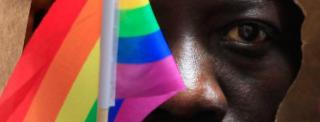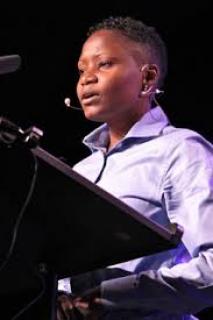Uganda and Beyond
By Global Connections & Emerging Communities
by Val Kalende (Reposted from the Huffington Post)
Uganda’s “jail the gays” bill will likely become law anytime soon perhaps as soon as this week. Ugandan President Yoweri Museveni has promised Ugandans that he will assent to the bill after receiving medical evidence from Ugandan medical experts that homosexuality is not a genetic disposition to human sexuality.
As Ugandan LGBT activists, we remain steadfast in our resolve not to relinquish the fight. But, where is global solidarity for the rest of Africa’s LGBT rights struggle?
Amid phenomenal worldwide outrage, the draconian proposed law has almost equaled Idi Amin and Joseph Kony in tainting Uganda’s image. So much that in 2012, the Ugandan government paid over $1 million to an Ireland-based public relations firm in a campaign to “whitewash” the country’s image abroad. While I still meet people who think Africa is a country, I meet many more who know about an East African country where “gays are killed.” These responses point to an undeniable fact: global solidarity is becoming one of the most powerful weapons against Africa’s homophobia.
My fear is we seem to be using one country’s story to understand a continental problem. In the process, not much is known about the situation in other countries. The “global day for action,” recently observed on February 10 in solidarity with LGBT Ugandans should be applied elsewhere in Africa where anti-gay laws are being debated or have been enacted. It should become a worldwide campaign with activists protesting anti-gay laws at embassies around the world. These actions can be coordinated with activists in African countries affected by such laws such that meaningful outcomes can be achieved.
In Cameroon, activists are under attack, and some have been killed. In Nigeria, activists have called for a global day of action but have also expressed disappointment over not seeing enough solidarity against Nigeria’s anti-bill that daringly passed without fanfare. From current trends of events, backlash against HIV/AIDS interventions can be predictable. Witch-hunts, blackmail, arrests, and murder will continue to rise.
In Russia, global solidarity and the Olympics have shed light on the country’s anti-gay “propaganda” law. In Uganda, politicians are beginning to respond to international criticism over the right-wing sponsored the Jail the gay bill and are turning to the Church to be at the forefront of the campaign against homosexuality. The church in Africa has become a safety net for homophobia mainly because it is safer to bash gays with the bible than it is to bash gays with politics. The Church in Uganda is mobilizing for a 2016 ballot on homosexuality. In fact, there is likelihood of growing factions in the Anglican Church as African Archbishops move to respond to Canterbury’s recent communiqué on its stand on homosexuality: the Church should practice love and tolerance.
In the United States, the campaign against Uganda’s anti-gay bill has redefined what it means to stand in solidarity with LGBT struggles abroad. When Hilary Clinton made a historic statement in support of LGBT people everywhere, “LGBT rights are human rights and human rights are LGBT rights” the importance of global solidarity began to resonate with most activists. In fact, there had been discussions on how to diminish harm should similar laws be proposed in other countries. Some writers warned of a “spillover” and others predicted a “wave of homophobia.” And, as witnessed in the past four years, gay rights have come under attack in Malawi, Zambia, Cameroun, Nigeria, Sierra Leone, Zimbabwe, India, and Russia. The influence of religion and the push back against Western imperialism is prevalent in these countries.
I believe, as Dr. King believed, “Injustice anywhere is a threat to justice everywhere.” Solidarity is not a sympathy-seeking, charity-seeking project calling for White messiahs to save the world. Solidarity speaks to a hidden desire in every human being to be human. Simply stated, solidarity is the African concept Ubuntu. To stand in solidarity with a cause for which one is not directly affected takes more than recognizing it as ‘Africa’s problem.”
At Kuchu Diaspora Alliance, a network of Ugandan LGBT people in the Diaspora, we are “amplifying the collective voice of our movement,” a slogan that is representative of the collective power of solidarity. With an African LGBT Diaspora beginning to emerge, we are organizing—in partnership with activists on the ground—for global action.
In my opinion, change is happening albeit not extensively. The resilience of African LGBT people is not in vain. Global solidarity is working but it should be louder and intentional to avoid what has happened in Nigeria, and what is waiting to happen in Uganda. All anti-gay laws operate in context and that should be how global solidarity is strategized. Launching a “global day of action” campaign against ALL anti-gay laws in Africa may just be what needs to happen. It is those tiny ripples of change that can be harnessed into long-term gain.
—
Val Kalende is a native Ugandan and life-long LGBTQ activist. “There is hope, when we look at the success we’ve managed to achieve in the last seven years,” she told the San Francisco Gate in 2010. “The bill has been a blessing in disguise in the way it has created a debate and visibility for LGBT issues and brought some allies to our side.”

